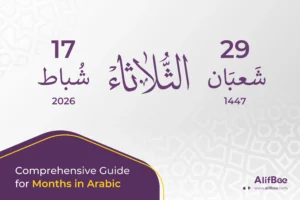Welcome to another article focused on the Arabic language and Arabic culture. In this series of new blogs, we are going to explore the richness and beauty of Arabic culture through a collection of Arabic proverbs. In every blog in this series, we will learn new proverbs about different themes and topics.
Along with the proverbs, we will also provide their English idiomatic equivalents or explanations to emphasize the universality of learning across different languages and cultures. These proverbs offer timeless lessons that can inspire us to pursue knowledge, grow, and live life with thoughtfulness and understanding.
Ready to boost your language with our 10 wise Arabic proverbs?
Here we go!
Proverb 1: العِلْمُ فِي الصِّغَرِ كَالنَّقْشِ عَلَى الحَجَر
Knowledge in childhood is like engraving on stone
lʻilmu fī alṣṣighari kālnnaqshi ʻalá alḥajar
This proverb emphasizes the importance of learning and acquiring knowledge from a young age. Just like engraving on stone, the lessons learned in childhood remain with us throughout our lives, forming the foundation of our understanding and worldview. There are two similar proverbs in English: 1) “Catch them young” and 2) “You can’t teach an old dog new tricks.”
Proverb 2: اِثْنَانِ لَا يَشْبَعَانْ: طَالِبُ عِلْمٍ وَطَالِبُ مَال
Two appetites are never satisfied: the pursuit of knowledge and the pursuit of wealth
Ithnāni lā yashbaʻān : ṭālibu ʻilmin waṭālibu māl Our second proverb highlights the idea that the pursuit of knowledge and wealth can be insatiable. Both desires, when properly channeled, can lead to personal growth and success. The closest equivalent in the English language is “The appetite grows with what it feeds on.”
Proverb 3: عَلِّمْنِي كَيْفَ أَصْطَادُ وَلَا تُعْطِنِي سَمَكَةً كُلَّ يَوْم
I’d rather you teach me how to fish than give me a fish every day
ʻAllimnī kayfa aṣṭādu walā tuʻṭinī samakatan kulla yawm
This proverb stresses the importance of teaching skills rather than simply providing ready resources. Empowering someone with knowledge enables them to become self-reliant and ultimately improves their quality of life.
This Arabic proverb has a well-known English equivalent that says: “Give a man a fish, and you feed him for a day; teach a man to fish, and you feed him for a lifetime.”
Proverb 4: العِلْمُ نُوْرٌ وَالجَهْلُ ظَلَام
Knowledge illuminates, while ignorance casts shadows
Alʻilmu nūrun wāljahlu ẓalām
This proverb compares knowledge to light and ignorance to darkness, emphasizing the transformative power of education and the importance of seeking knowledge to improve oneself and the world around them.
Proverb 5: مَنْ تَعَلَّمَ لُغَةَ قَوْمٍ أَمِنَ مَكْرَهُم
He who learns a people’s language will be safe from their deceit
Man taʻallama lughata qawmin amina makrahum
Learning a new language not only allows us to communicate with others but also helps us understand their culture, values, and way of thinking. This proverb highlights the importance of cultural understanding and empathy in a globalized world.
Proverb 6: خُذِ الحِكْمَةَ مِنْ أَفْوَاهِ البُسَطَاء
Take wisdom from the mouth of the simple
Khudhi alḥikmata min afwāhi albusaṭāʼ
This proverb reminds us that wisdom can be found in unexpected places and that we should remain open to learning from others, regardless of their perceived intelligence or status.
Proverb 7: مَا كُلُّ مَا يُعْلَمْ يُقَال
Not everything you know is worth saying
Mā kullu mā yuʻlam yuqāl
This proverb reminds us that wisdom can be found in unexpected places and that we should remain open to learning from others, regardless of their perceived intelligence or status.
Proverb 8: إذَا تَمَّ العَقْلُ نَقُصَ الكَلَام
With a mature mind comes less talk
Idhā tamma alʻaqlu naquṣa alkalām
This proverb highlights the value of thoughtful speech and the idea that wisdom often comes with restraint in communication. It serves as a reminder to choose our words carefully and to speak with purpose. There is a similar proverb in English that says: “Wise men speak because they have something to say; fools because they have to say something”
Proverb 9: مَنْ طَلَبَ العُلَا سَهِرَ الَّليَالِي
He who aspires to greatness must endure sleepless nights
Man ṭalaba alʻulā sahira allalyālī
This Arabic saying emphasizes the necessary dedication and sacrifice that come with seeking success or greatness. It tells us that nothing worthwhile comes easily; greatness often requires late nights and long hours of work or study. It is a reminder that in the pursuit of our ambitions, we will face challenges that require us to step out of our comfort zones, make sacrifices, and display determination.
As you continue your journey of learning Arabic, remember this proverb when the going gets tough. Embrace the process and understand that these ‘sleepless nights’ will be worth it in the end. There is a similar proverb in English that says: “No pain, no gain.”
Proverb 10: لَا يُنَالُ العِلْمُ بِرَاحَة الجِسْم
One cannot acquire knowledge without exertion
Lā yunālu alʻilmu birāḥah aljism
Our last proverb underlines the idea that gaining knowledge or learning anything new requires effort and hard work. It’s not just about mental effort, but also about the physical strain one might experience during learning. It’s a reminder that comfort and ease rarely lead to profound learning experiences.
This proverb is especially relevant to language learners. Learning Arabic, like learning any language, requires consistent effort and practice. It’s not always going to be easy, but the wisdom and understanding you will gain from the process will be worth the effort.
Final word
Arabic proverbs offer invaluable insights into the importance of knowledge and wisdom in our lives. By examining these proverbs and their English equivalents, we can appreciate the universality of wisdom across different languages and cultures. You can learn more Arabic proverbs about friendship and wisdom.
If these words inspired you, imagine what learning Arabic itself can open for you. Try AlifBee free for 14 days and keep growing.








